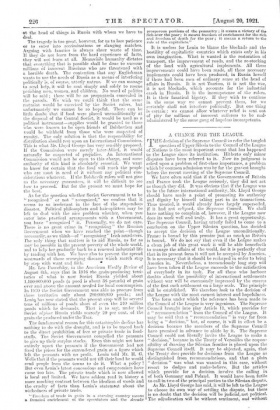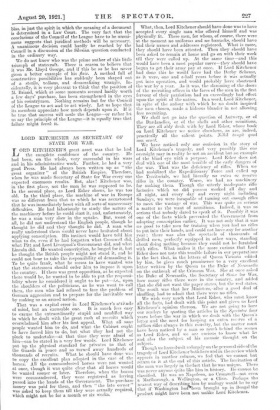A CHANCE FOR THE LEAGUE.
11HE decision of the Supreme Council to refer the tangled question of Upper Silesia to the Council of the League of Nations is the most important event that has happened to the League since its institution. Hitherto only minor disputes have been referred to it. Now its judgment is asked upon a problem of first-class importance, a problem which by common admission was by far the gravest brought before the recent meeting of the Supreme Council.
We have often said that if the Governments of Britain and France took the League seriously, they did not act as though they did. It was obvious that if the League was to be the future international authority, Mr. Lloyd George should have made a point of promoting its authority and dignity by himself taking part in its transactions. Thus treated, it would already have largely superseded, if it had not eclipsed, the Supreme Council. We shall have nothing to complain of, however, if the League now does its work well and truly. It has a great opportunity. The Supreme Council, having utterly failed to come to a conclusion on the Upper Silesian question, has decided to accept the decision of the League unconditionally. France is bound by this promise just as much. as Britain is bound. We do not say that even if the League makes a clean job of this great work it will be able henceforth to manage the affairs of the world, for it is perfectly clear that in its present form it will not be accepted by America. It is necessary that it should be reshaped in order to bring America in. Nevertheless, a tremendously long step will have been taken if the League succeeds to the satisfaction of everybody in its task. For all those who harbour doubts about the possibility of international settlements without war will be enormously impressed by the success of the first such settlement on a large scale. The principle will be established. We therefore look to the decision of the League with the most earnest interest and hopefulness. The form under which the reference has been made to the Council of the League is very ingenious. The Supreme Council brought into play Article 11, which provides for a " recommendation " from the Council of the League. It may be said that a " recommendation " is very far from being a " decision," but, of course, it will in effect be a decision because the members of the Supreme Council have promised in advance to abide by it. The Supreme Council could not literally invite the League to make a " decision," because in the Treaty of Versailles the respon- sibility of drawing the Silesian frontier is placed upon the Supreme Council itself. It may be objected, again, that the Treaty does provide for decisions from the League as distinguished from recommendations, and that a plain " decision " was what was wanted in this case, without resort to dodges and make-believe. But the articles which provide for a decision involve the calling in of both Germany and Poland. It would have been futile to call in two of the principal parties to the Silesian dispute. As Mr. Lloyd George has said, it will be left to the League to choose its own way of settling the dispute, but there is no doubt that the decision will be judicial, not political. The adjudication will be without sentiment, and without bias, in just the spirit in which the meaning of a document is determined in a Law Court. The very fact that the conclusions of the Council of the League have to be unani- mous suggests that juridical methods will be necessary. A unanimous decision could hardly be reached by the Council in a discussion of the Silesian question conducted in the ordinary way.
We do not know who was the prime author of this little triumph of statecraft. There is reason to believe that it was Mr. Lloyd George, and if this be so he has never given a better example of his flair. A method full of -constructive possibilities has suddenly been shaped out of a sterile, tedious, and demoralizing wrangle. In- cidentally, it is very pleasant to think that the position of Briand, which at some moments seemed hardly worth a few days' purchase, has been strengthened in the eyes of his countrymen. Nothing remains but for the Council of the League to act and to act wisely. Let us hope that its members appreciate how much depends upon it. If it be true that success will make the League—or rather let us say the principle of the League—it is equally true that failure might break it.



































 Previous page
Previous page